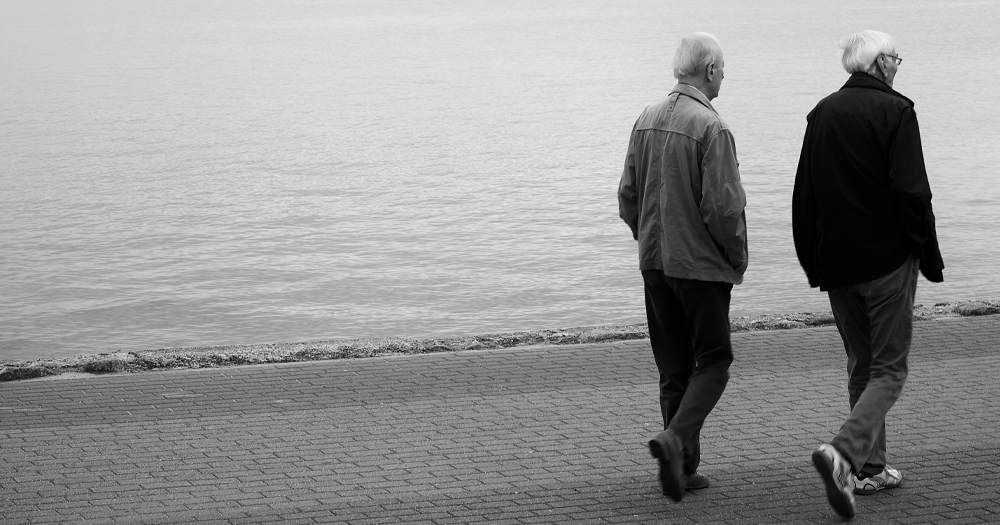Looking back at the past, Irishman Colin Daly reflects on the importance of queer friends and the impact that losing them can have on our lives.
Since I started delving into my personal Irish LGBTQ+ history, I have discovered that at least four people I knew have passed away in the last couple of years and one has passed away since I started writing about it, which is not that long ago. This makes me extremely sad when I think about it.
Losing a queer friend can be extra devastating because their friendship acts as a protective barrier against those who wish to harm us. Because of who we are, this friendship can act as a confessional of sorts where we can reveal our inner selves in intimate detail and know we will not be judged for being “different”. It’s the kind of relationship where we can get “forgiveness” for any “sins” against the prevailing heteronormative narrative.
It could be said that I didn’t know any of these people really well and yet their passing has really touched my soul and dimmed the light on the horizon slightly. The world will never be quite as bright as it was. Their deaths have affected me in a way that I hadn’t anticipated and it is because I am gay.
It’s not a question of realising my own mortality; it’s about realising what I had and what I still have. It’s a connection with my gay past and at the same time a diminution of living memory. No longer in living memory for those people, just in memory.
Friends are extremely important to LGBTQ+ people, even if only on a basic level, so when they pass from this world they take a little bit of our soul with them.
“Sat together like three little bears” brings back a wonderful memory of going for a drink with Don Donnelly and one other person in The Norseman in Temple Bar after a Tel-A-Friend session in the Hirschfeld Centre in 1981. For those who don’t know Don, he was a major figure in setting up the Tel-A-Friend service.
This was at the very beginning of my odyssey from being frightened and confused to confident and proud. Three little bears with a commonality and brotherhood that sat us apart both literally and metaphorically from the rest of the clientele. I could finally sit in a pub and have a drink with other gay people. It felt completely normal, considering it was the first time I had ever knowingly done it, as we just chatted about issues that interested us. I was ready to take on the world.
Now Don is gone and it is painful for me because his company and friendship were part of what I am today. Of that, there is no doubt. I hadn’t seen him for a very long time and this is a salutary lesson to hold tight to your friends.
I have previously written about queer community and how it enables us to live better or improved lives. It should also be an assist in times of grief or emotional struggle. The friends we make within this community are a kind of family. They are with us as we struggle against adversity, empathise with us and join in our celebrations for minor victories in our joint struggles.
Indeed, it can often be the case that our queer family know us far better than our biological one. Our gay or queer friendships go way beyond the cellular or the mysterious helical DNA structures that we are composed of.
And it’s not just strong friendships that can bond us. We can now get married “‘til death do us part”. I was never a big fan of marriage. I never really saw the point – although I understood the attraction – and I never wanted children. But when the opportunity came along for same-sex marriage, I immediately supported it. It was, to a large extent, a question of equality for me.
The idea of formalising one’s love and commitment, in front of peers, now has a vital attraction for me. It also sorts out the legal issues – at least some – of bereavement. Now an LGBTQ+ person can leave a proper will for his or her husband or wife without the fear of any homophobic relatives denying them this basic right. And they can leave a historical mark of companionship and love that death cannot eradicate.
The past has a peculiar way of catching up with us and it was reading about Don Donnelly’s passing that has really embedded the “three little bears” story in my mind with all its concomitants. It was effectively just a throw-away phrase in a casual conversation but the words are etched into my soul now as a permanent reminder of a fabulous brave person who dedicated their life to the struggle for LGBTQ+ equality and is also a reminder of the very earliest beginnings of my own journey and introduction to the Hirschfeld centre and the start of my queer friendships.
When our queer friends die, there is a feeling of losing something that can never be replaced in the “normal” world, and this can cause profound sadness. But remember the old saying: “Don’t cry because it’s over. Smile because it happened”
© 2024 GCN (Gay Community News). All rights reserved.
Support GCN
GCN is a free, vital resource for Ireland’s LGBTQ+ community since 1988.
GCN is a trading name of National LGBT Federation CLG, a registered charity - Charity Number: 20034580.
GCN relies on the generous support of the community and allies to sustain the crucial work that we do. Producing GCN is costly, and, in an industry which has been hugely impacted by rising costs, we need your support to help sustain and grow this vital resource.
Supporting GCN for as little as €1.99 per month will help us continue our work as Ireland’s free, independent LGBTQ+ media.
